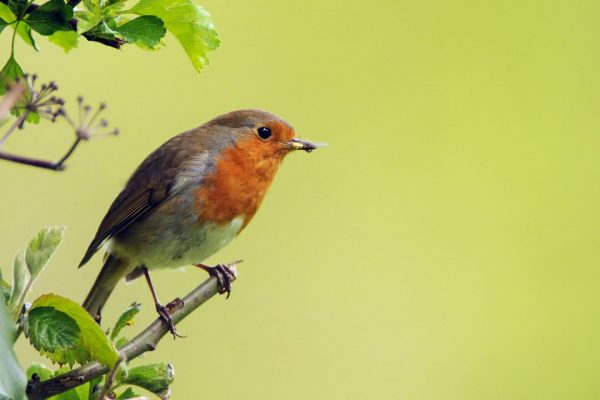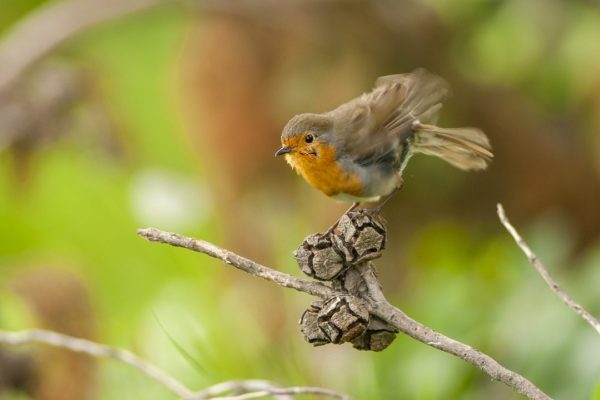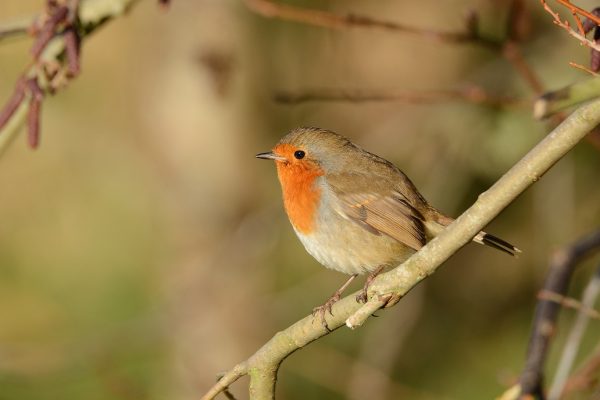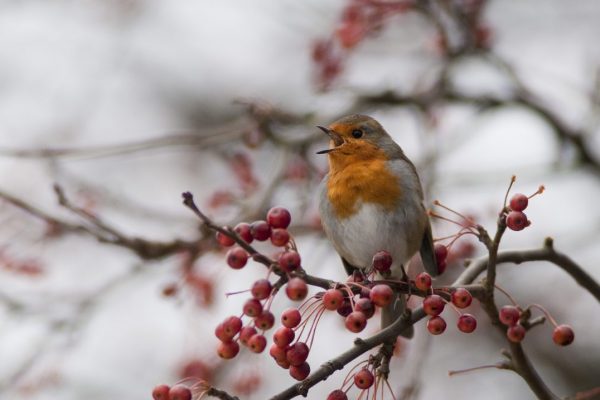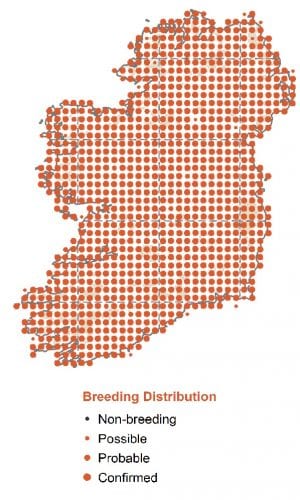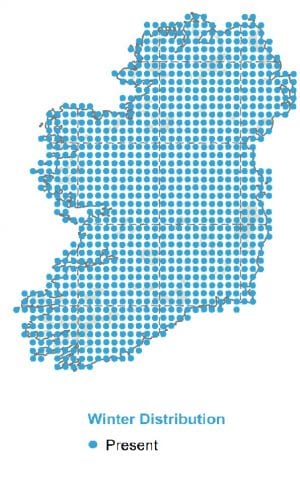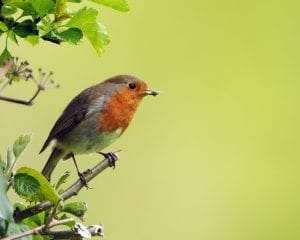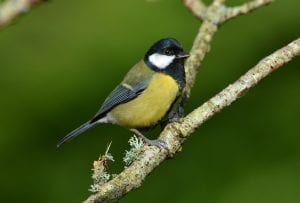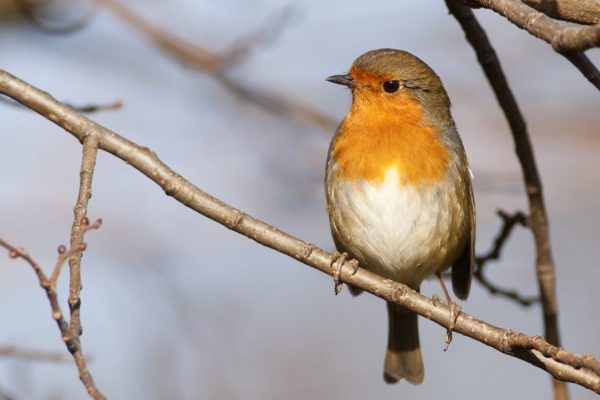
Robin
| Irish Name: | Spideog |
| Scientific name: | Erithacus rubecula |
| Bird Family: | Chats |
green
Conservation status
Conservation status
Status
Resident. Ireland's most widespread garden bird almost every year.
Identification
Probably the most familiar garden bird - the bright orange-red breast and facial area make it unmistakable. Upperparts a uniform greyish brown, belly and lower breast greyish white. The bill is dark and pointed and the legs black. Can appear very plump and rounded, especially in cold weather when the bird fluffs out its feathers. Can be very confiding, often perching motionless close to gardening activity. Occasionally cocks tail briefly.
Voice
Song a wispy, relatively slow series of notes ranging up and down the scale, becoming more rapid in parts - the notes rolling into each other. Somewhat melancholy - winter song even more so. Calls include a "tick" which is sometimes repeated to sound like an old clock being wound up. Also a plaintive, barely audible "seep".
Diet
Insects and some fruits, including apples. Readily comes to bird tables.
Breeding
Over 2 million pairs breed across the Republic of Ireland, in many different habitats. Nest usually well-concealed in a bank, ivy or cavity in tree or wall. Sometimes chooses unusual location such as a hat or garment hanging in garden shed. Will use open-fronted nestboxes.
Wintering
Widespread. Recorded in 99% of Irish gardens each winter.
Blog posts about this bird
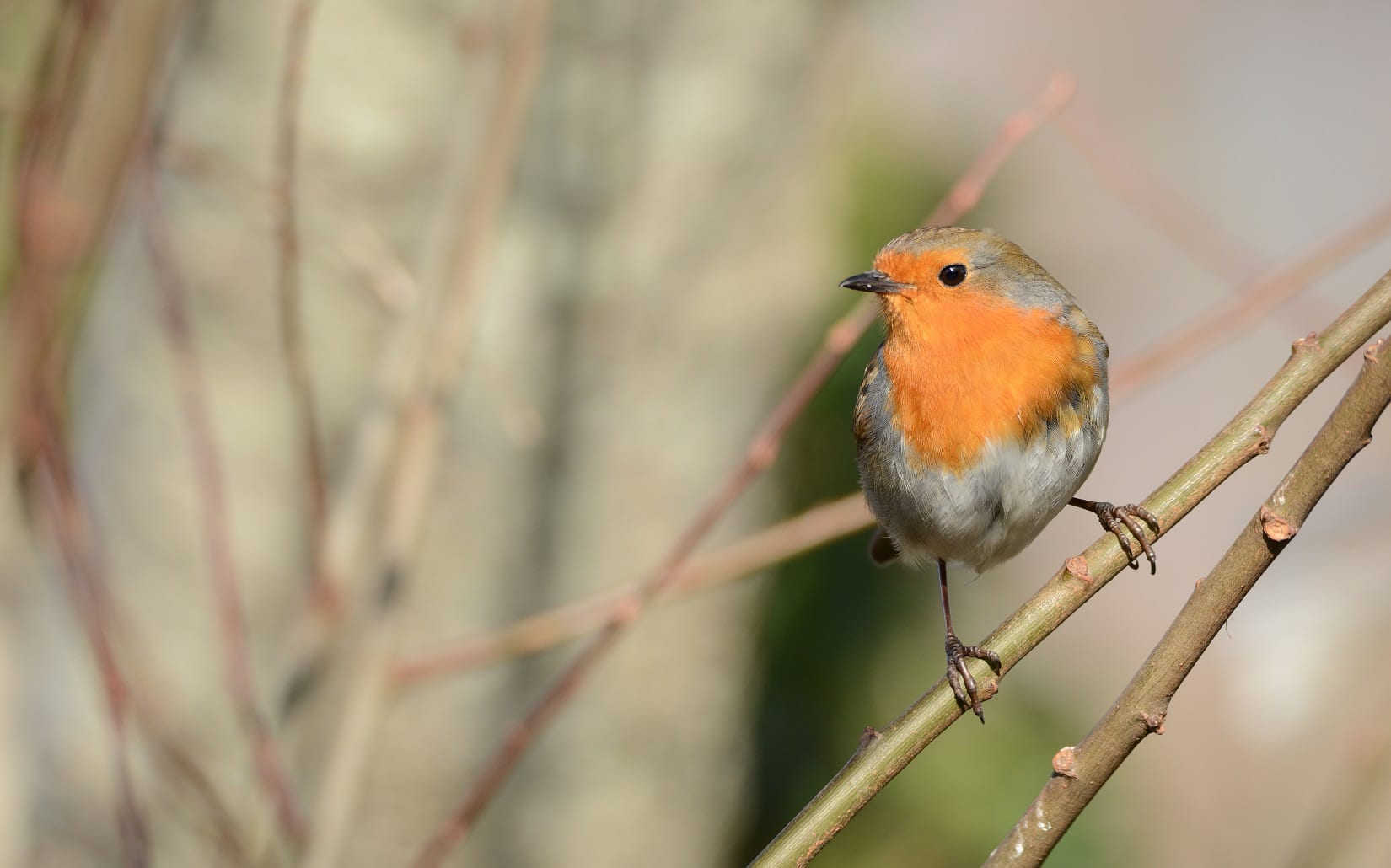
BirdWatch Ireland Calls for Public Participation in Critical Bird Survey Starting November 25th
BirdWatch Ireland is calling on people across the country to help monitor the health of the country’s bird populations by counting the birds visiting their garden over the winter.
Ireland’s longest-running and most popular citizen science survey, the Irish Garden Bird Survey, will commence on Monday, November 25th and run until the end of February. Taking part is free and simple, yet impactful, as all participants contribute to a crucial body of data that will help to inform monitoring and research into bird populations and environmental change.
Last year’s survey, which saw over 1,600 households across the country participating, revealed the Robin as Ireland’s top garden bird once again, present in 96% of gardens. Blackbird and Blue Tit followed in second and third place, occurring in 94% and 91% of gardens respectively. However, all three species appeared in fewer gardens than at any point in the last thirty years due to the mild winter weather conditions, which reduced birds’ need for garden feeders.
Of the top 30 species seen in Irish gardens last winter, 25 occurred in a lower percentage of gardens than the previous winter.






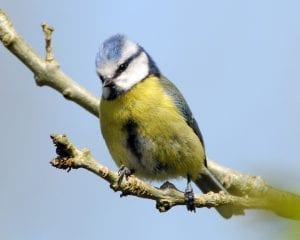
Blue Tit. Photo: Michael Finn.
“We often get emails from people early in the winter wondering where their garden birds are, but last winter people all over the country were commenting on how quiet their gardens were,” said Brian Burke, coordinator of the Irish Garden Bird Survey. “This week we’re seeing very cold conditions across the country, and that’s definitely driving more birds into gardens at the moment, so it’ll be interesting to see what the coming weeks bring. The more people who do the survey, the more we can learn about these sorts of links between climate, birds and our environment.”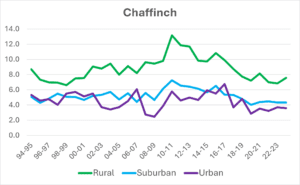
Average Chaffinch numbers per garden show that they occur in greater flock sizes in rural gardens than urban or suburban ones.
Other species including Chaffinch, Coal Tit and Jackdaw were at their lowest occurrence in 30 years, while Song Thrush and Pied Wagtail showed a huge drop of 12% since the previous winter. One species, the Siskin, bucked this trend, occurring in 41% of gardens compared to 26% the previous year. This is largely due to their reliance on alder, birch, spruce and pine tree seeds as a food source. Considering the cyclical nature of seed supply, such peaks in Siskin numbers are expected every three years or so. They tend to occur in relatively few gardens in December, increasing in January, and becoming much more common throughout February. Similar mid-winter increases were seen with Redpoll and Long-tailed Tit, amongst other species.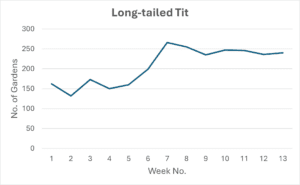
Long-tailed Tit occurrence in gardens increased greatly after the first week of January (Week 6) and remained high until the end of February.
While it was anticipated that Greenfinch would experience declines due to the impact of the deadly Trichomoniasis condition on the species, it was one of very few species with a stable trend and virtually no change from the previous winter. Greenfinch have occurred in 47-48% of gardens in each of the last three winters, which may indicate that their rapid declines have stabilised. The species is currently on the Amber list as a species of medium-level conservation concern. As usual, there are clear differences in the birds visiting gardens across the country. Notable differences in Ulster include Blackbird being the most widespread species, Goldfinch not featuring in the top 10 (12th), and it being the only province with either Jackdaw or Song Thrush in the top 10. Out west in Connaught, Coal Tit and Wren came in 9th and Starling only in 13th. Leinster was once again the only region to feature Woodpigeon in the top 10. The top 10 in Munster was very similar to the national rankings, though notably, the Rook was the 11th most common species there, much higher than elsewhere. As a conservation charity with a small team, BirdWatch Ireland is reliant on members of the public to help gather vital data about Ireland’s many bird species. In addition to contributing valuable information, participants often enhance their bird identification skills and gain insights into the journeys these birds undertake. Indeed, some of last year’s participants reported ringed birds that visited their gardens including a Goldfinch discovered in Tipperary that was originally ringed in Maine-et-Loire in France, and a Redwing found in Carlow that was ringed at Sandwich Bay Bird Observatory in Kent, England.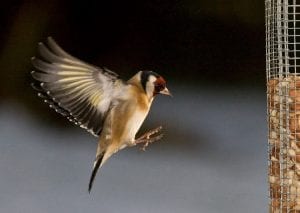
Goldfinch. Photo: Kevin Murphy.
Taking part in the Irish Garden Bird Survey is a win-win for science and for individual participants and this year, BirdWatch Ireland hopes to encourage even more people to take part. All you need to get involved is a little bit of time each week to watch your garden birds, access to a garden or any outdoor space such as a community garden or school grounds, and a sense of curiosity. The Irish Garden Bird Survey is once again sponsored by Ballymaloe, whose support in recent years has helped ensure the survey has gone from strength to strength, improving monitoring at national level and allowing for greater focus on conservation issues facing individual species. Commenting on their ongoing support for the survey, a Ballymaloe spokesperson said: "United in our commitment to the environment and inspired by the legacy of our forefather, Ivan Allen, Ballymaloe businesses as a group proudly sponsor BirdWatch Ireland's annual Irish Garden Bird Survey. Mr Ivan Allen, the husband of Myrtle Allen and a devoted lover of birdlife, cherished the natural habitat around Ballymaloe House, and practised sustainable farming way ahead of his time. In his memory, our collective support for the Irish Bird Survey reflects our ongoing celebration of Mr Allen's passion for birdlife and commitment to conservation. Together Ballymaloe House Hotel, the Ballymaloe Cookery School and Ballymaloe Foods are honoured to contribute towards supporting the preservation of Irish birdlife via BirdWatch Ireland's important national Irish Garden Bird Survey initiative in his name. We encourage as many households as possible to get involved, every entry helps BirdWatch Ireland protect birdlife on the island of Ireland." To learn more about the survey and to get involved, see here: https://birdwatchireland.ie/our-work/surveys-research/research-surveys/irish-garden-bird-survey/.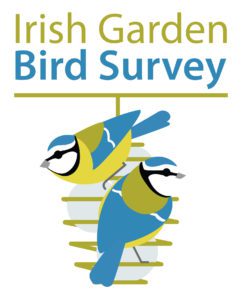
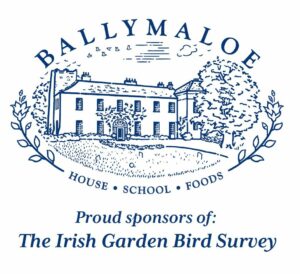
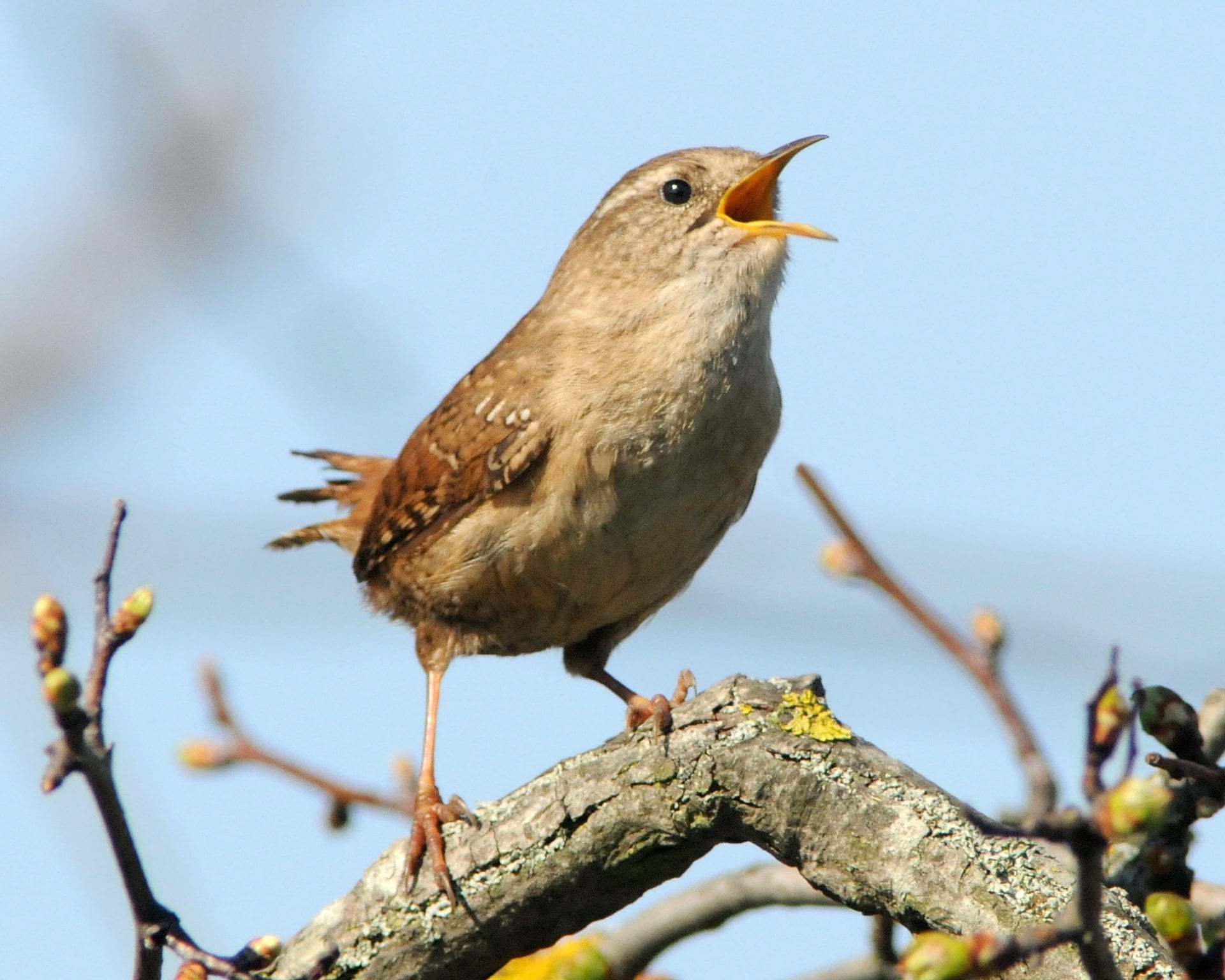
Tune In to Nature at a BirdWatch Ireland event this International Dawn Chorus Day
The soaring demand for concert tickets coupled with their sky-high prices may have left many music fans in Ireland disappointed this year but did you know that there are free, nationwide concerts taking place throughout April and May? All you need to do is step outside!
One of nature’s most spectacular phenomena, the dawn chorus is a symphony of birdsong that can be heard in the early hours of a spring morning. While this natural wonder kicks off at the beginning of the breeding season, it rises to a crescendo in April and May when our resident birds are joined by summer migrants.
The dawn chorus may sound soothing and inviting to us humans, but these feathered vocalists have different intentions. For them, the purpose of singing is to defend a territory and attract a mate. What sounds like a beautiful song to you is actually a male bird telling others to back off, while in turn, attempting to woo female birds in the vicinity.
As singing can reveal a bird’s location to potential predators, a bird will always wait until there is sufficient daylight to see danger coming before starting their tune. For this reason, the birds with the biggest eyes such as Blackbird, Song Thrush and Robin will begin to sing earlier in the morning than other species. As the morning grows brighter, more species will join, leading to the symphony of song we know as the dawn chorus.
One of the best things about the dawn chorus is that it can be enjoyed by anyone, anywhere. All you need is access to an outdoor space where birds are present and, if you’re not used to rising early, a decent alarm clock.
Robin. Photo: Michael Finn.
RTÉ Radio One’s live Dawn Chorus programme
If you don’t have access to an outdoor space or, if you prefer to enjoy the music from the comfort of your bed, you can still experience the magic of dawn chorus. On International Dawn Chorus Day this Sunday, May 5th, Ireland's airwaves will come alive with birdsong as the annual RTÉ Radio One live Dawn Chorus programme makes a return. This year, the Mooney Goes Wild team will once again be bringing listeners across Ireland and, thanks to RTÉ’s online presence, the world, a celebration of Irish birdsong from midnight through to 7:00 a.m. on RTÉ Radio One, in a simulcast with RTÉ Lyric fm and BBC Radio Wales. Derek Mooney will record live from the RTE studios in Dublin, while Niall Hatch and Jim Wilson will be based at BirdWatch Ireland’s Cuskinny Marsh Nature Reserve in Cobh, Co. Cork. From there, they will give listeners an insight into the fascinating dawn chorus, all while the birdsong builds in real time. Elsewhere across the country, Richard Collins, Éanna Ní Lamhna, Eric Dempsey and Terry Flanagan will bring us the birdsong live from their localities. The RTE Dawn Chorus programme is winner of both the National PPI Radio Award for Innovation and the coveted International Rose d’Or award.Great Tit. Photo: BirdWatch Ireland.
BirdWatch Ireland Dawn Chorus Events
While the dawn chorus is a wonderful thing to witness alone, sharing it with others is also a very special experience. The BirdWatch Ireland Branch network will be running a number of free dawn chorus events over the coming weeks. See our list below to find an event near you! Cavan The Cavan Branch of BirdWatch Ireland will hold a Dawn Chorus Walk at Turbet Island, Belturbet on Sunday, May 5th. Meet at Turbet Island Car Park (entrance opposite Spar) at 4.30 a.m. Wear warm clothes, bring a snack and leave the dog at home please. Tea and biscuits to follow after the walk. Clare The BirdWatch Ireland Clare Branch Dawn Chorus Outing will take place on Sunday, May 12th to the Mullaghmore area in the Burren. We hope to hear Cuckoo, Whitethroat, Blackcap, Willow Warbler, Yellowhammer along with the more common songbirds. This is a unique habitat for such an event as the sun rises over the limestone rock. Meet at the Grotto, Corofin at 5 a.m. Cork BirdWatch Ireland’s Cork branch will hold a Dawn Chorus Event on Sunday, May 5th at 4.30 a.m. This will take place in the Glen River park on Ballyhooly Road, Cork City. The Eircode for the car park where we will meet is T23 A440. Cork (West) BirdWatch Ireland’s West Cork Branch will run a Dawn Chorus Event on Sunday, May 12th at Esk Mountain Estate, Glengarriff. It will kick off at 4.30 a.m. Visitors can park at Botanical B&B (Eircode P75 AW26; look out for our BirdWatch Ireland sign). This is 4.5 km north of Glengarriff on the N7. The walk will mainly be on woodchip paths, stone steps and boardwalks so sturdy footwear is recommended, as is warm clothing and, most importantly, midge repellent! It will last an hour or so and there will be breakfast baps and refreshments available to purchase afterwards. Unfortunately, the event this year is not wheelchair friendly. For more information, contact event leader Jez Simms on 087 689 6964. Dublin South BirdWatch Ireland’s South Dublin Branch will hold their Dawn Chorus Event on Sunday, May 12th in Killiney Hill Park. Meet in the car park at the top of Burmah Road off Dalkey Avenue at 4 a.m. Warm clothing is recommended. Fingal BirdWatch Ireland’s Fingal Branch will run a Dawn Chorus Outing at Turvey Park on Sunday, May 12th. Meet at the car park at 7 a.m. Kilkenny The Kilkenny branch of BirdWatch Ireland is holding a Dawn Chorus Outing on Sunday, May 12th at Jenkinstown Wood, Co. Kilkenny. We will be meeting at 4.30 a.m. in the car park in Jenkinstown. Mayo The BirdWatch Ireland Mayo Branch will hold their Dawn Chorus Event on Saturday, May 4th at North Mayo Heritage Centre. Meet in the car park at 6.45 a.m., with event kicking off at 7 a.m. All welcome. We ask that all children are accompanied by an adult. Warm clothing is recommended. This event may be cancelled due to bad weather. Notice will be provided via WhatsApp and, if feasible, via email and Facebook. Meath This year, the annual Dawn Chorus Event of the BirdWatch Ireland Meath Branch will take place in Balrath Woods on Monday, May 6th at 5 a.m. Join us as we observe various bird species during the early morning hours. After the walk, there will be music and drinks available. All welcome. To get an idea of numbers on the day please register here: https://www.birdwatchirelandmeath.com/event-details-registration/dawn-chorus-2024-balrath-woods. See directions here: https://maps.app.goo.gl/yKKFSQxsHddTXDsA9. Sligo The BirdWatch Ireland Sligo Branch Dawn Chorus Walk will take place on Sunday, May 12th at Union Wood. It will be led by Trevor Hunter. Meet at Ballisodare United FC car park, Ballisodare, Co. Sligo at 5.00 a.m. Tipperary The BirdWatch Ireland Tipperary Branch will run a Dawn Chorus Event at Lough Derryville, Littleton, Co. Tipperary on Sunday, May 5th. Meet at the car park at 5 a.m. View location here: https://maps.app.goo.gl/Xj7pvK4H1x71URae6 Westmeath Join the BirdWatch Ireland Westmeath Branch for their annual Dawn Chorus Event on Sunday, May 5th. Enjoy a guided walk to explore the world of bird song at Belevedere House, Gardens and Park. Free admission. Event will take place from 5 a.m. until 7 a.m. WicklowJoin the BirdWatch Ireland Wicklow Branch for their Dawn Chorus Event on Sunday, May 12th at 5 a.m. at Avondale Forest Park, Rathdrum, Co. Wicklow.
This Dawn Chorus walk will follow the 3 k.m. long Cairn Trail. We expect to be back in the carpark between 06:30 and 07:00. Thanks to Coillte and Beyond the Trees Avondale for facilitating (and waiving the car park fee for our early morning start!).

